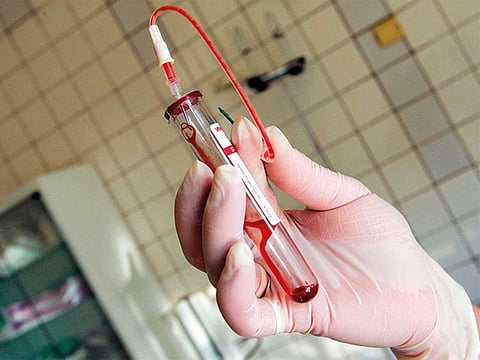Panic grips in Pakistan's Larkana after 13 children tested HIV positive
Larkana continues to top the list of districts most affected by HIV in Sindh province

Dubai: Panic gripped Larkana – a key city of Pakistan’s Sindh province – after 13 children were tested positive for human immunodeficiency viruses (HIV).
According to the HIV Aids Control Programme official, sixteen of the 13 children tested are infected with HIV in the Ratodero district of Larkana. Blood samples of 16 children have been sent to a laboratory for further tests.
“The children who are tested HIV positive are between the ages of four months and eight years,” Dr Abdul Hafeez, In Charge of the HIV Aids Control Programme in the area.
He said that parents of the affected children would also be tested.
Larkana continues to top the list of districts most affected by HIV in Sindh with the number of AIDS patients in Larkana rising to more than 2,500, reported Geo TV.
Larkana is the stronghold of Pakistan Peoples Party (PPP) which has been in government in Sindh province for decades. But the city has one of the worst healthcare facilities.
The results are very worrisome, Dr Hafeez said, urging the need for take drastic steps to create awareness about HIV amongst the population in the area.
20,000 new HIV cases
According to WHO, Pakistan is registering approximately 20,000 new HIV infections annually, the highest rate of increase among all countries in the region.
The international body says mortality among Pakistanis living with the virus, which causes the deadly AIDS disease, is also rising, in spite of the availability of lifesaving antiretroviral therapy.
The latest government figures show that only 16 percent of the estimated 150,000 people living with HIV had been tested and only 9 percent have access to lifesaving treatment.
"The remaining 135,000 people are walking around in the communities as carriers of (HIV) infection who are ready to transmit infections to those who are not infected, even to their unborn babies," Dr. Saima Paracha of the National AIDS Control Program, told media recently.
Main causes of HIV in Pakistan
Officials say the HIV epidemic in Pakistan remains largely concentrated among the key populations, including people who inject drugs, the transgender community, sex workers and their clients and men who have sex with men.
Official estimates show that Pakistan has seen a 45 percent increase in new HIV infections since 2010
The report said AIDS-related deaths in the world have fallen from 1.9 million in 2005 to one million in 2016, adding that "for the first time the scales have tipped."
The year 2016 saw 1.8 million new infections, almost half the record number of some 3.5 million in 1997, said UNAIDS.
In total, 76.1 million people have been infected with HIV, the virus that causes AIDS, since the epidemic started in the 1980s. Some 35 million have died.
No cure
As of yet, there is no HIV vaccine or cure, and infected people rely on lifelong anti-retroviral therapy to stop the virus replicating.
Without treatment, HIV-infected people go on to develop AIDS, a syndrome that weakens the immune system and leaves the body exposed to opportunistic infections such as tuberculosis, and some types of cancer.
Treatment carries side effects and is costly, but allows infected people to be healthier for longer.
Sign up for the Daily Briefing
Get the latest news and updates straight to your inbox







